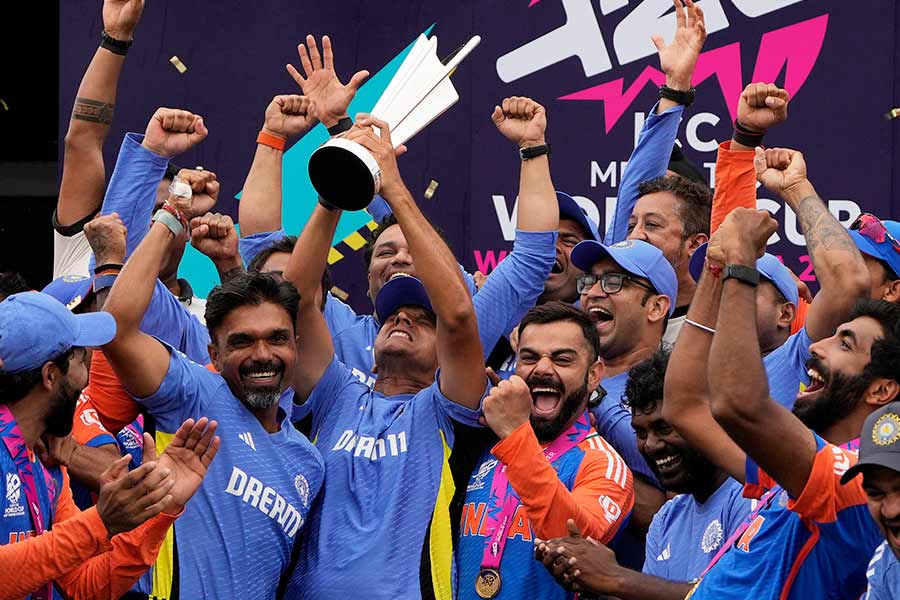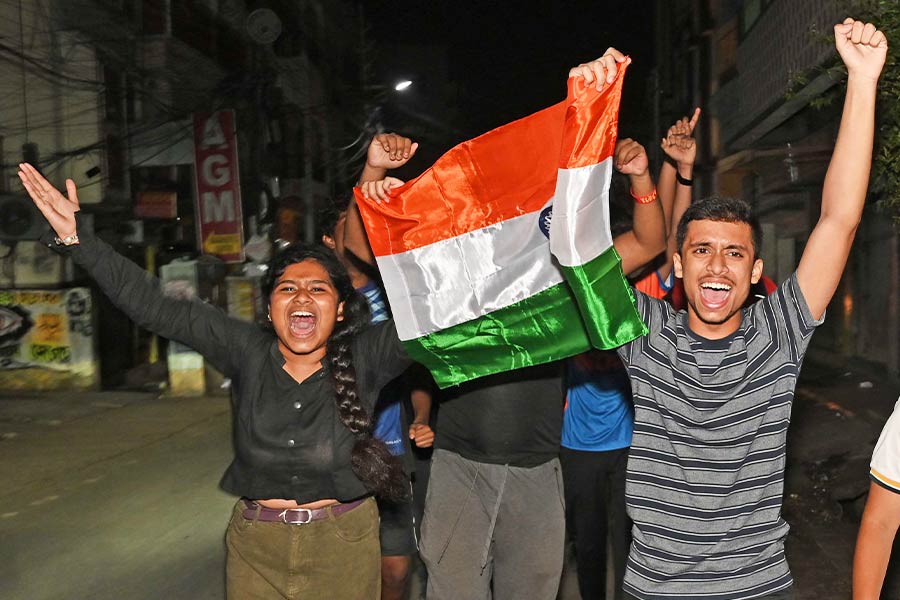It ended in tears in the Caribbean. Sitting in the dressing room in Port of Spain, a shattered Rahul Dravid gazed around emptily, as his final act as a player in World Cup cricket was to get knocked out as Indian skipper against Sri Lanka. More than 17 years later, Dravid was in the Caribbean again, this time in Barbados to bring down the curtain on his tenure as coach of India. The tears flowed once more, but these were tears of triumph, not agony.
When Virat Kohli handed Dravid the ICC Men’s T20 World Cup trophy at the Kensington Oval, the patron saint of the gentleman’s game was gentle no more. Dravid unleashed an explosion of ecstasy so fierce that his whole body shook along with the cup. And with that, Dravid had finally shaken off the trauma of finishing second best at two ICC finals over the past year, including the heartbreak at Ahmedabad on November 19. He had also exorcised the demons of 2007 — a calamitous campaign that marked the nadir of his captaincy. But Dravid’s was far from the only redemption arc that was sealed with India’s seven-run win against South Africa on Saturday. On a day where despair seemed destined once more, the Men in Blue came back from the brink, shedding the burden of history to write it afresh.
Pandya, Bumrah and SKY come up clutch
Hardik Pandya was visibly welling up before running in to bowl the delivery that would end India’s 11-year drought for an ICC title. Perhaps he was replaying the incessant trolling he had been subject to on and off the pitch during the most recent season of the IPL. Perhaps he was remembering how injury had ruled him out of the business end of last year’s home World Cup. Perhaps he was simply relieved, knowing redemption was just a few paces away. Just three overs earlier, redemption would have felt as far as his native Surat for Pandya, who started the 17th over with South Africa needing 26 runs off 24 balls. Even when Pandya drew a nick off the belligerent Heinrich Klaasen, the match was South Africa’s to lose. For India to claw their way back, someone had to put on the brakes. Someone had to come up clutch.
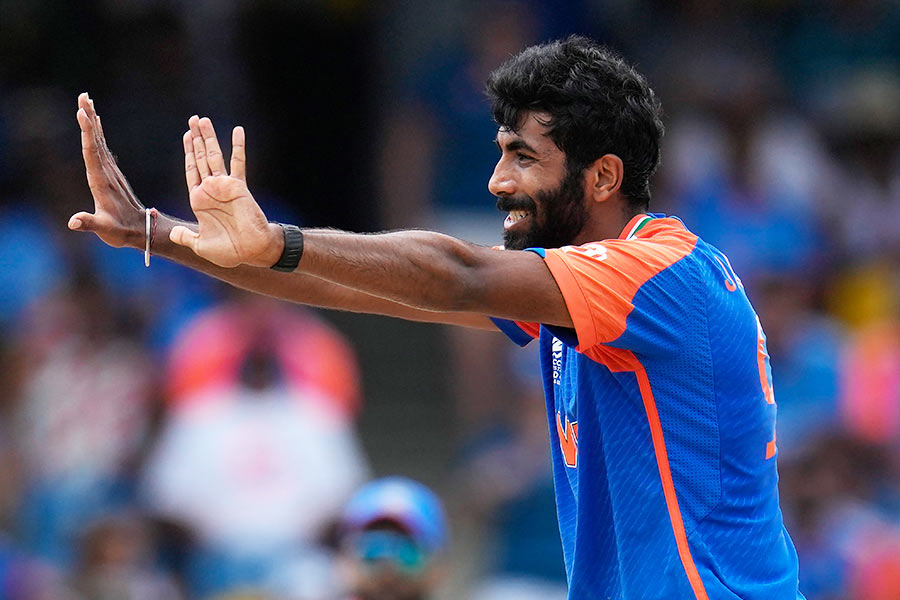
Jasprit Bumrah was named as the World Cup’s player of the tournament
Step up Jasprit Bumrah, who was handed the last of his four overs with half the Proteas side still alive and their closer-in-chief David Miller already in his groove. Did the thought of letting his country down ever cross Bumrah’s mind? Seven years ago to the month, Bumrah had bowled arguably India’s costliest no-ball in a tournament final. The beneficiary in question, Pakistan’s Fakhar Zaman, had proceeded to punish Bumrah by batting India out of the game. Pakistan had won the 2017 ICC Champions Trophy by 180 runs. If deep down Bumrah had been smarting from those memories, he didn’t show it. His imperious command over line and length choked South Africa, literally and figuratively. Marco Jansen, much like Reeza Hendricks in the second over, was cleaned up by the kind of improbable ball that Bumrah produces at least twice every over these days. Fittingly adjudged as the player of the tournament, Bumrah’s redemption wasn’t just of a spearhead living up to his role. It was that of a perfectionist so sure of his abilities that he could summon victory through vibes alone.
And yet, for all of Bumrah’s brilliance, the result might have looked very different had Suryakumar Yadav not turned into Superman to dismiss Miller. Against Australia in that fateful final last year, SKY had found the ball an elusive entity, as it kept missing his bat under increasing pressure. On this occasion, with Miller certain of having sent a full toss beyond the ropes, Suryakumar exerted his own gravitational pull to bring the ball and redemption within his grasp. With his mind as nimble as his feet, Suryakumar caught the ball, lobbed it delicately, danced around the boundary cushions like a ballerina, and somehow re-entered the field of play in time to grab the ball before it could meet the ground. His sensational balance threw South Africa into disarray, with Miller incredulous that Suryakumar had briefly defied physics to indefinitely prolong South Africa’s misery.
Kohli heals the wounds of 2014 and 2016; Rohit’s catharsis
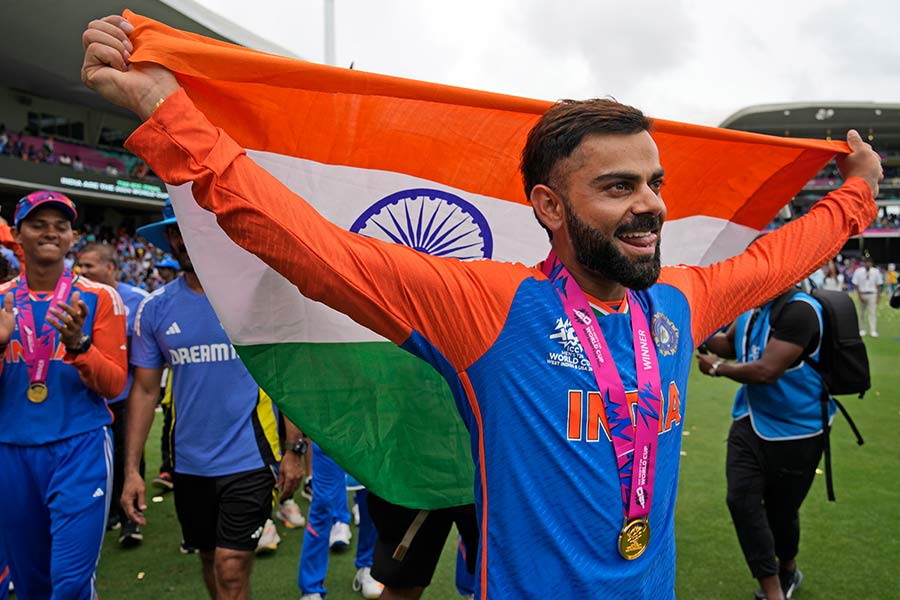
Virat Kohli announced his retirement from T20Is after winning his first T20 world title
Speaking of misery, Kohli had endured the most miserable ICC tournament of his life leading into the showpiece encounter. But come the big day, Kohli redeemed himself by going back to his basics. Instead of trying to smash the leather off the ball with uncharacteristically adventurous shots, India’s talisman dug deep into his reservoirs of patience, not hitting a boundary for more than 10 overs at one stage. Backing himself to make up for lost balls, Kohli anchored and accelerated at the right junctures (right being largely retrospective!), accumulating 76 of the most valuable runs of his T20I career. His post-match interview with Harsha Bhogle confirmed that this wasn’t the unstoppable juggernaut from the 50-over World Cup last year. This was a waning great battling self-doubt as much as the opposition, who eventually resorted to his old strengths instead of manufacturing new ones. In what proved to be his international swansong in the shortest format, Kohli healed the wounds of 2014 and 2016, where being the competition’s outstanding batter had not been enough to take India across the line.
If Kohli had made up his mind that 2024 would be his T20 farewell, then Rishabh Pant was intent on making it the year of his resurgence. A horrific car accident in December 2022 could have ended Pant’s life, let alone his career. Handed an unlikely shot at redemption, Pant pushed the envelope to return to competitive action way sooner than anyone expected (or hoped), forcing his way into the Indian fold by dint of an impressive IPL. Coming in at number three, Pant enjoyed a prolific tournament both in front of and behind the stumps, especially with his performances in the US leg of the World Cup, which were pivotal to India being the first team to maintain an unbeaten record en route to becoming T20 world champions.
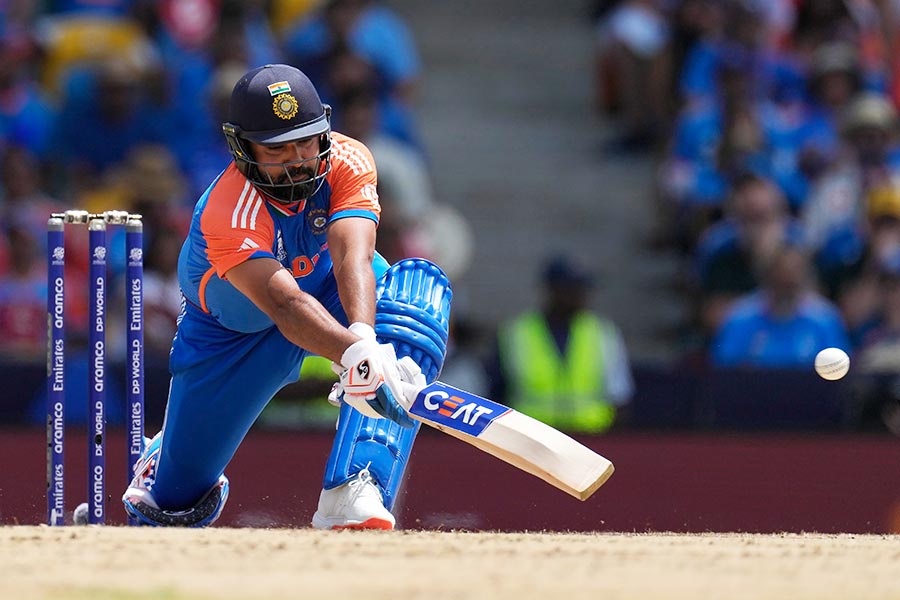
Rohit Sharma’s selfless batting set the tone for other batters to follow at the World Cup
World champions. Two words that would have rung repeatedly in Rohit Sharma’s ears when he watched his compatriots celebrate at the Wankhede Stadium in 2011, a celebration that he could only partake in from home. When India were brushed aside by England in the semi-finals of the T20 World Cup in 2022 (where Rohit himself had scored 27 off 28 balls), Rohit’s days as leader appeared to be numbered. But Rohit wasn’t going to slip into the shadows without one last surge. Well into his mid-30s, Rohit chose to overhaul his game completely. Letting go of any semblance of main character energy, Rohit went from a batter prioritising volume of runs to someone focusing on their impact. Unafraid to put his form, even his legacy, at stake, Rohit’s approach worked wonders at last year’s World Cup, and served as the catalyst in the West Indies this time around. His 92 off 41 balls versus Australia in the Super Eights was a tour de force of high-percentage risks sprinkled with moments of audacious batsmanship, the sort that come to Rohit as naturally as Mumbai slang.
Seeing Rohit beat the turf before collapsing on it seconds after the final was decided would have been cathartic for millions of fans whose hearts have been warmed by his selflessness over the past two years. When a bunch of his teammates rushed to embrace Rohit, still flat on the turf, it was symbolic of India’s multiple redemption arcs converging into the figure of one man and his refusal to give up until the holy grail was regained.
The biggest redemption from India’s T20 World Cup victory belongs to the Indian cricket fan
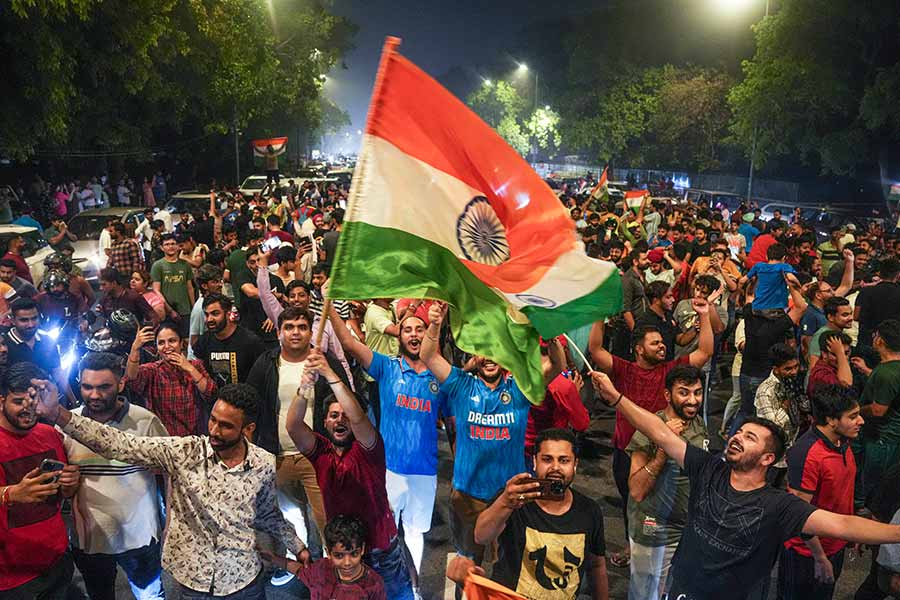
Jubilant fans rejoicing in India’s first ICC tournament victory since the Champions Trophy in 2013
Notwithstanding India’s remarkable comeback, it feels baffling, in a broader context, to suggest that the world’s foremost cricketing giant requires redemption. That winning one trophy would mark a seismic shift in Indian cricket. For the truth is it won’t. Had India lost to South Africa on Saturday, it would’ve done nothing to alter the game’s present reality — the fact that international cricket orbits India’s irresistible force field. But there is a difference between running a sport and relishing it. For all intents and purposes, India runs world cricket. The ICC plays second fiddle to the BCCI and everything in a way (as Michael Vaughan never tires of mentioning) feels set up for India to come, see and conquer.
However, for the regular Indian cricket fan, the mind-boggling revenues generated by Indian cricket count for nothing. Nobody is out on the streets past midnight rejoicing in how their country’s cricket board can manoeuvre others into obedience. For all its impact on the sport, India’s structural dominance of cricket doesn’t excite romantics. The romantics who still see cricket as a serendipitous outlet for dreaming vicariously rather than as a gigantic money-making machine oiled by ever-expanding clout. The romantics who believe that the Indian cricket team belongs more to them than to string-pullers in suits with trained smiles. It is for them that redemption matters, for it is they who turn matches into stories, players into heroes and cricket into a carnival. The biggest redemption, therefore, from India’s T20 World Cup victory belongs to the Indian cricket fan, for not letting their passion for India’s biggest sport perish at the altar of power.
